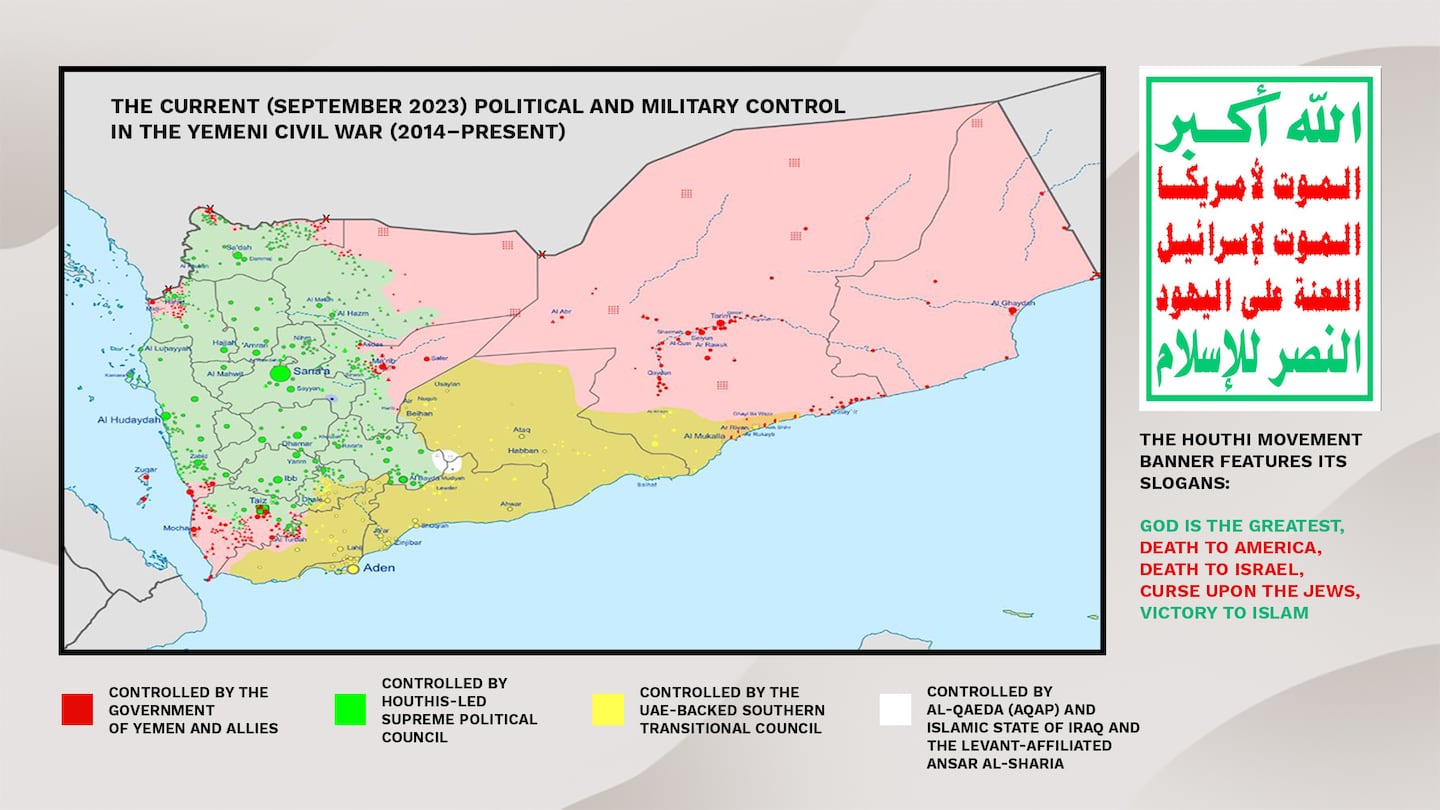The Houthis are an indigenous Arab tribe in Yemen who make up most of the members of an organisation known officially as as Ansar Allah (Supporters of God), which is a Shia Islam political and military group that started in Yemen in the 1990s. The group’s name also refers to its first leader Zaidi religious leader Hussein al-Houth, who killed by the Yemeni military in 2004, sparking a Houthi insurgency.
The Houthis emerged as an opposition movement to Yemen President Ali Abdullah Saleh, whom they accused of corruption and being backed by Saudi Arabia and the United States. In 2003, influenced by the Lebanese Shia political and military organization Hezbollah, the Houthis adopted their official slogan against the United States, Israel, and the Jews, according to Wikipedia.
Al Jazeera has reported the Houthis rose to prominence in 2014, when the group rebelled against Yemen’s government,” causing it to step down and sparking a crippling humanitarian crisis”.
The group then spent years, with Iran’s backing, fighting a military coalition led by Saudi Arabia. The two warring sides have also repeatedly tried to hold peace talks without success. The Houthis say they want a democracy in which women have rights, according to Wikipedia.
Most recently Yemen’s Houthis have been targeting vessels in the southern Red Sea and the Bab al-Mandab Strait in attacks that the I group says aim to support the Palestinians as Israel and Hamas wage war, Reuters reports.
The Gaza war has drawn in the United States and its allies on the side of Israel, and Iran and its Arab proxy forces on the side of Hamas, raising the risk of a wider Middle East conflict.
Disrupted global trade
The Houthis says they will target all ships heading to Israel, regardless of their nationality, and warn all international shipping companies against dealing with Israeli ports.
The attacks have disrupted global trade flows, with shipping firms and oil companies saying they would avoid the Suez Canal, adding to freight costs and making voyages longer as vessels opt to circumnavigate the African continent instead.
That in turn has led to US military involvement with its naval vessels now patrolling the strait and of recent days starting to shoot down Houthi missiles and bombing Houthi military targets.
US Defense Secretary Lloyd Austin on December 19 said the United States was leading a multinational operation to safeguard commerce in the Red Sea. He said the United Kingdom, Bahrain, Canada, France, Italy, the Netherlands, Norway, Seychelles and Spain were among nations involved in the Red Sea security operation, which would be known as “Operation Prosperity Guardian”, Reuters reported.
Yesterday New Zealand’s government joined that coalition
Bab al-Mandab, or the Gate of Tears (named for its perilous navigation conditions) is the southern outlet of the Red Sea, situated between Yemen on the Arabian Peninsula and Djibouti and Eritrea on the African coast. The Bab al-Mandab is 18 miles (29 km) wide at its narrowest point, limiting traffic to two channels for inbound and outbound shipments, divided by the island of Perim.
Winning support at home
It is one of the world’s most important routes for global seaborne commodity shipments, particularly crude oil and fuel from the Gulf bound for the Mediterranean via the Suez Canal as well as commodities bound for Asia, including Russian oil.
About 7.80 million barrels per day of crude and fuel shipments transited the strait in the first 11 months of 2023, up from 6.60 million bpd throughout 2022, according to oil analytics firm Vortexa. On average, Vortexa tracked 27 tankers carrying crude or fuel each day in 2023, up from 20
The international community has had a history of using naval forces to protect navigation from piracy off the Horn of Africa, especially as Somali piracy surged in the 2005-2011 period.
For example,, in December 2008, the European Union launched “Operation Atalanta” to tackle Somali attacks on cargo ships. NATO’s Operation Ocean Shield, as well as a multinational naval force known as Combined Task Force 151, have also been involved in anti-piracy protection. last year, Reuters has reported.
Some analysts argue that the Yemen conflict is a proxy for a wider war between Muslim behemoths Saudi Arabia and Iran.
But analysts talking to Al Jazeera say that attacks help the Houthis in other ways. Domestically in Yemen, the group has seen a sharp uptick in recruitment, riding on popular support for the people of Gaza. The attacks, and the response from major powers like the US, also force other countries and governments to negotiate with them, giving them de facto legitimacy at a time when they are not officially recognised internationally as Yemen’s government.

